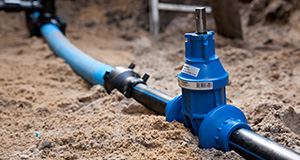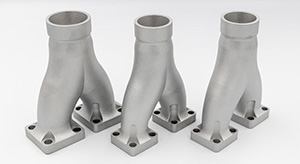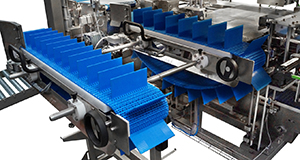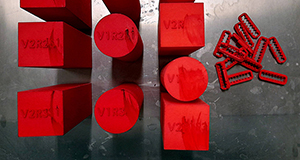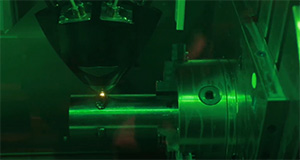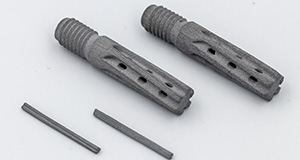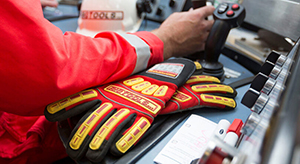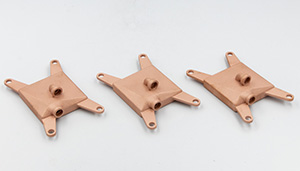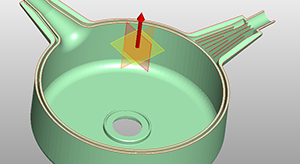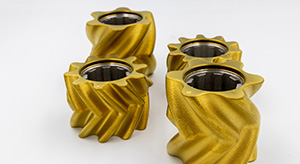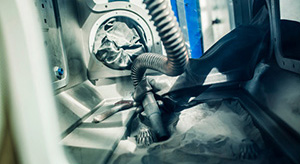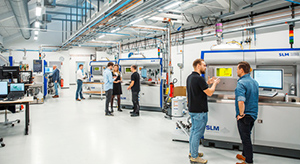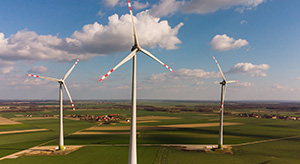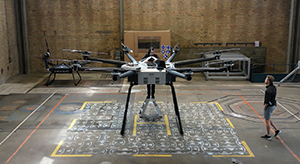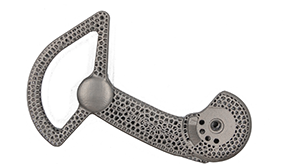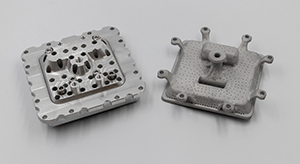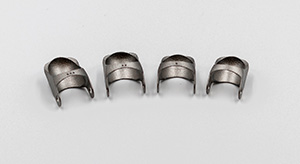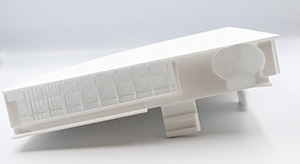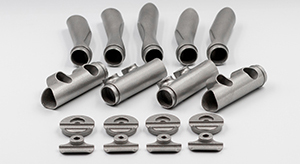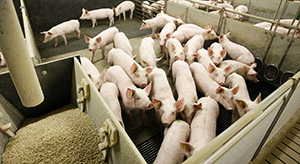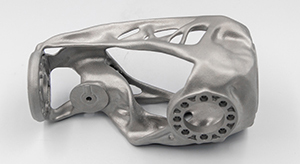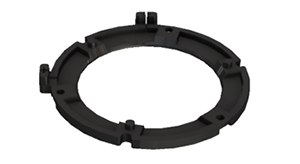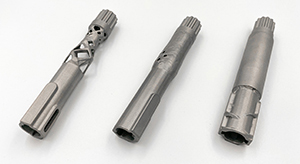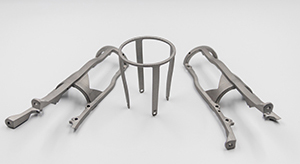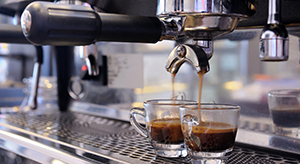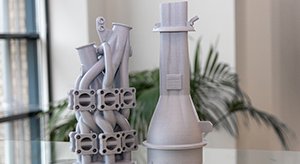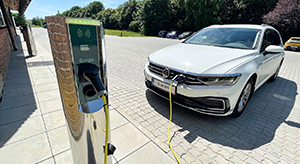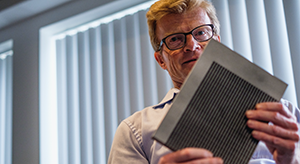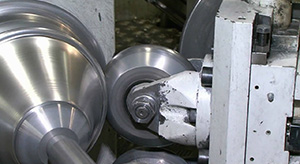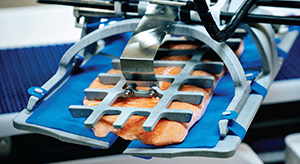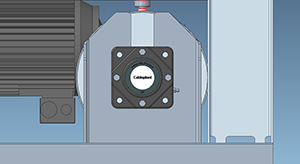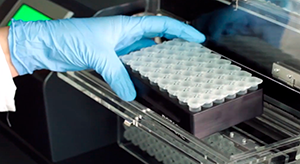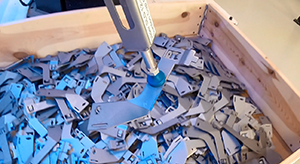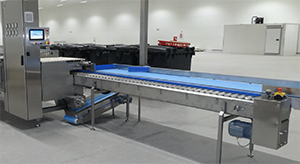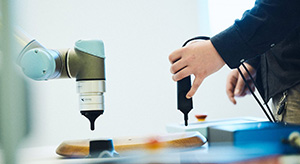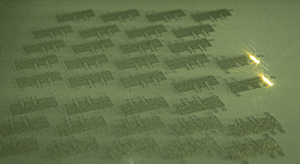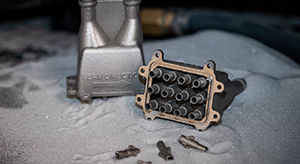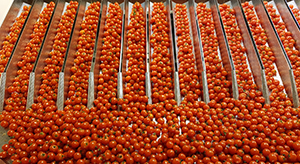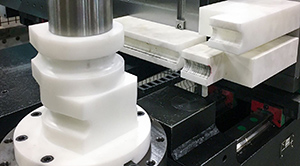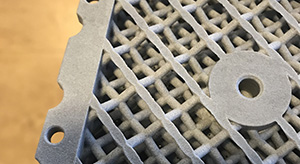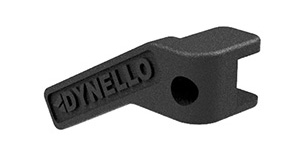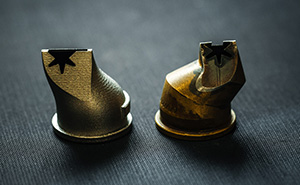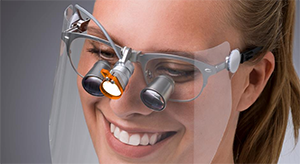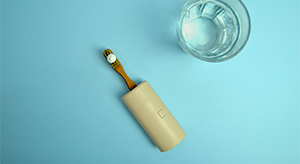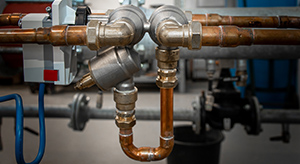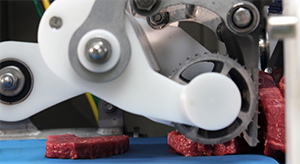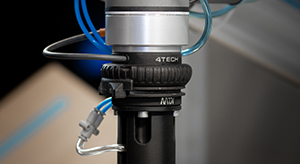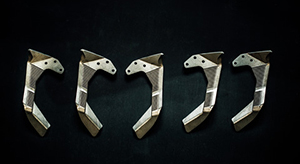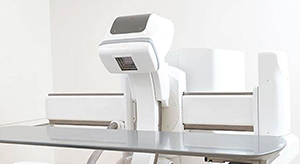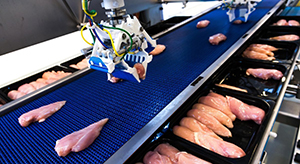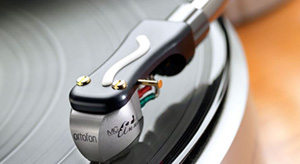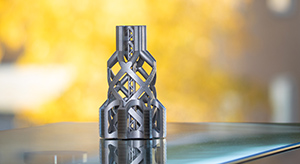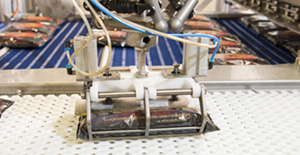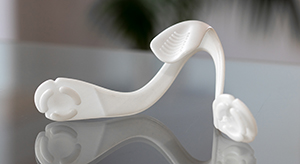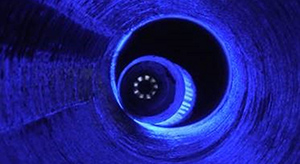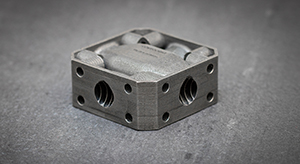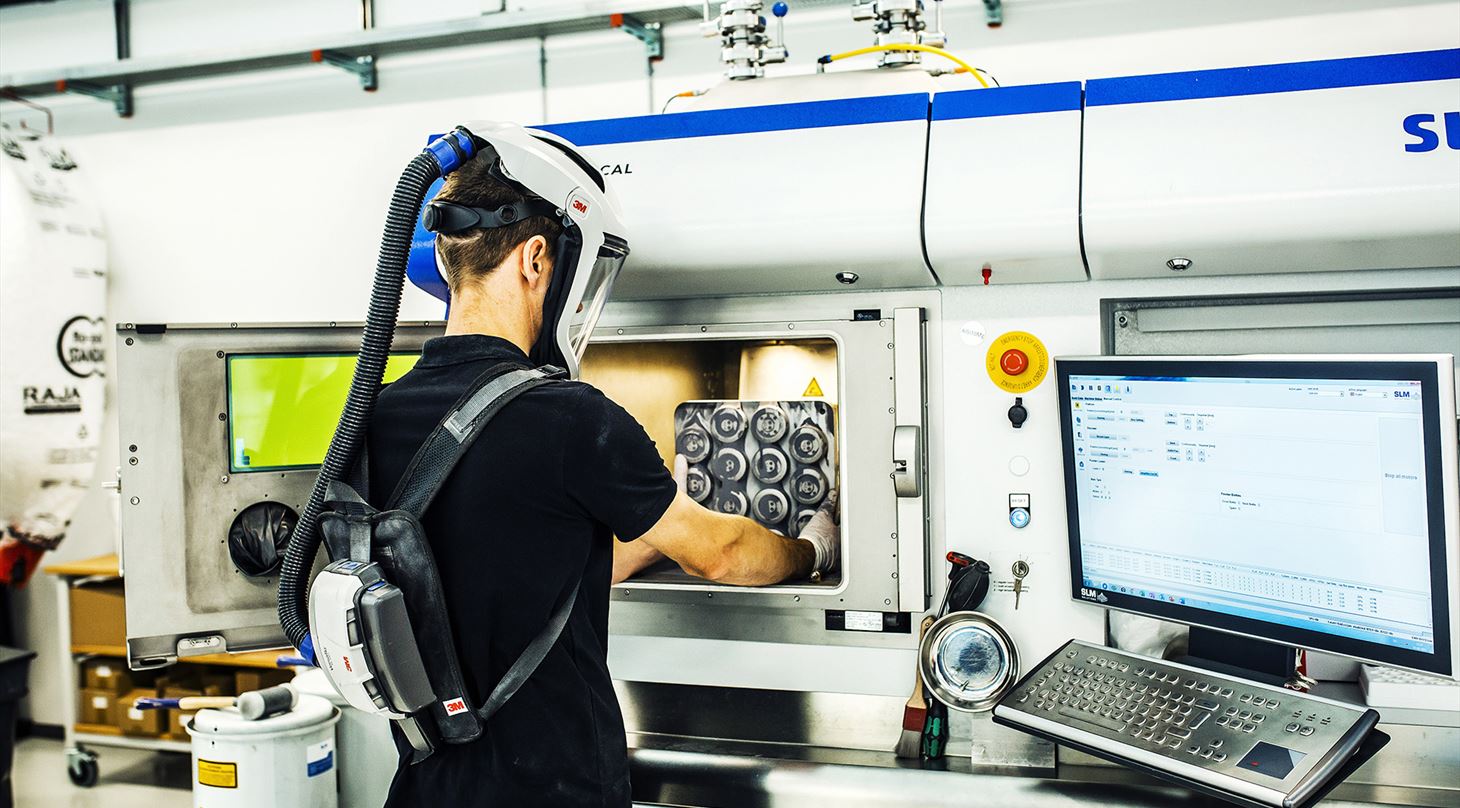
Cases and articles with 3D printing - Get the best inspiration to get started
We supply a wide variety of clients with 3D printing in both metal and plastic, and we continuously gather examples of the development of 3D printed parts that can serve as inspiration for others who have started - or would like to start - working with 3D printing.
For some companies, printing a component or a part is perfectly obvious, and for others - and this is in most cases - it requires an innovation and development process to identify where, how and why it makes sense to 3D print one or more parts.
At the Danish Technological Institute, our customer assignments cover a broad spectrum - from developing parts through pilot production to producing large batches of 3D-printed items, which form part of the company's production chain.
See our articles about 3D printing
Below you can read more about some of our customer cases.
AVK produces injection molded valves for firefighting, gas supply, drinking water, and wastewater. A desire for greater control in production and higher quality of the end result led them to explore metal 3D printing with the help of the Danish Technological Institute.
The Danish company Advansor produces CO2 climate solutions in the form of refrigeration systems - heat pumps or air conditioning systems - and they experienced issues with pressure loss before one of their ejectors. Therefore, DTI helped them investigate whether the design could be optimized for 3D printing.
SR Pack builds packaging machines for the food industry – and they had a challenge with a carrier for their flight belts. Thanks to 3D printing and help from the Danish Technological Institute, that challenge was solved.
How do we develop new standards for coloring materials to increase workplace safety? That was the question Pers Group sought to answer in a MADE Material Demonstrations project with the Danish Technological Institute, where colors were tested on 3D printed parts.
Ravn Industri had assistance from the Danish Technological Institute in a MADE materials demonstration project to develop a hybrid manufacturing method. 3D printing of specific steel materials enables time and cost savings in the long run.
Norse is a Danish company that produces cutting tools and protective equipment for a wide range of industries. For the revelopment of a new tool, they had help from the 3D printing specialists at the Danish Technological Institute, and they achieved lower volume and potential sustainability benefits.
Rigtools makes specially designed tools for oil rigs worldwide, and they have experienced challenges in optimizing equipment and machinery. Therefore, they received assistance from the Danish Technological Institute to test new 3D printing technology and investigate materials to optimize production.
Zenvo is a Danish sports car manufacturer that hand-builds so-called hypercars at their factory in Præstø. In an AM design optimization course, the company had help from the Danisg Technological Institute to investigateo whether metal 3D printing could assist in optimizing a suspension upright.
Heatflow makes solutions within thermal systems which can be connected to e.g. servers to utilize the waste heat for district heating – for this, they wanted to investigate the possibilities of using 3D printing to address the thermal challenges - and they had help from the Danish Technological Institute
When designing equipment for advanced research facilities, there are extremely high demands on both quality and function. Recently, a demonstration at the Danish Technological Institute showed, that the two things can be combined using 3D printing.
Bühler and the Danish Technological Institute has tested the possibilities of using 3D printing in titanium for dough rotors - this was done in a MADE Material Demonstration project. The results show that AM technology can help the company reduce the weight and delivery time of the component - at the same cost.
The hunting shop HUNTER'S POINT has invested in a metal 3D printer which will print silencers in titanium. The Danish Technological Institute helped during the purchasing process and handles the operation of the printer while the store's gunsmith is trained.
With the help of the Danish Technological Institute, the Danish provider of services to the energy sector, Welltec, has purchased and commissioned its own metal 3D printer. This means that Welltec can make their services faster and more efficient in the future.
Bollfilter manufactures industrial filters for filtering liquids such as lubricating oil and water - especially within the maritime sector. With the help of the Danish Technological Institute, the company has now had a chance to test 3D printing.
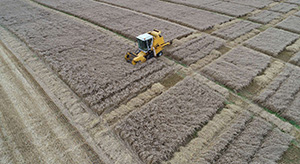 Danish Technological Institute
Danish Technological Institute
A collaboration between the specialists within 3D printing, field trials and food technology at the Danish Technological Institute led to enormous savings and increased flexibility for customized racks used for test vials.
Even the best idea can struggle to get off the ground without the right direction and the necessary funding. The Danish start-up Reblade was aware of this, so they sought help from the Danish Technological Institute.
The Danish startup Airflight benefited from metal 3D printing in a design optimization course, where they succeeded in reducing the weight of a bracket for drone wings by as much as 67% - with the help of the Danish Technological Institute.
CeramicSpeed specializes in bearings for bicycles but also makes various gear components. Here, the company participated in an innovation process, where they investigated whether one of their components could be optimized with 3D printing.
BEWI produces polystyrene, and in a 3D printing design course, they succeeded in reducing both the weight, price and delivery time of some of the tools used in the production - and the printed tools also appear to be more efficient.
High Precision Systems has developed exoskeleton gloves. In a 3D printing design coursess, they managed to improve the 3D-printed titanium gloves by cutting the thickness in half, thus increasing both grip strength and reducing wear and tear on finger joints.
During the recently completed 3D printing design course DfAM – Design for Additive Manufacturing - Linatech was given the opportunity to optimize a component for a machine that handles blood samples. The course not only offered good results but also even more incentive to get started with 3D printing.
The right ratio between strength and weight matters in cycling. As specialists in handcrafted bicycle frames, BenBen Cykler knows this, so they chose to participate in a 3D printing design optimization course, where they looked at different special components.
Washpower's participation in the 3D printing course DfAM has given the opportunity to develop a component for their series of washing robots for pig pens. In the future, developments with 3D printing may result in a significant reduction in water and energy consumption.
Larsen Strings produces some of the world's best strings for some of the world's best musicians - and in a 3D printing design optimization course they had the opportunity to test 3D printing for a special tool in production.
During a 3D printing design optimization course with the Danish Technological Institute, the company Scan-Speak was given the opportunity to start developing highly detailed prototypes – this gave the opportunity to use new materials.
Serman & Tipsmark works with hydraulics and makes test systems for hydraulic components. Here, they saw a potential for optimizing various components with 3D printing, and this was investigated in more detail in the design optimization course, DfAM
Newtec makes optical sorting machines as well as packing and weighing machines, and for this they also use camera technology. For one of these cameras, a lattice structure had to be used to fixate the optical components, and the design was optimized for 3D printing.
With metal 3D-printed spare parts, it is possible to reuse expensive, worn-out milk pumps. The coffee supplier Bentax discovered this in a MADE Material Demonstration project, where they had help from the Danish Technological Institute.
Among other things, Tetra Pak makes systems for ice cream production. Here they have designed a nozzle where you can mix several colors of ice cream and place them on the production line in a number of different shapes. It is 3D-printed at the Danish Technological Institute.
 Bühler Meincke - Nozzles for icing
Bühler Meincke - Nozzles for icing
Bühler Meincke develops and produces machines for cookie and biscuit production worldwide - and they use 3D printing for a number of components on their various machines. One of these components is a nozzle, which is used to put icing on various cookies.
The Danish company Hamag A/S develops and manufactures products and solutions that support all types of fuels - and they have really adopted 3D printing. The Danish Technological Institute helps with larger productions.
Cheaper and better production of radar antennas with metal 3D printing - this was the result of a MADE Material Demonstration project, where Nordic Radar Solutions received help from specialists at the Danish Technological Institute to evaluate materials and get started using AM.
It is possible to spin and shape a 3D-printed round plate with built-in cooling channels. Olsen Metaltrykkeri and Danish Technological Institute proved that in a MADE Material Demonstration project, where they have successfully tested the ancient craft of metal spinning together with new additive technologies.
For a one of their food processing setups, Marel needed to develop a new gripper for handling entire salmon sides of 40-50 cm. Therefore, they contacted the Danish Technological Institute to find out if it was possible to 3D print in that size - fortunately it was.
Cabinplant produces food equipment and processing solutions for the food industry, and in a MADE demonstration project, they proved that is possible to use 3D printing in their equipment. This was done with the help of the Danish Technological Institute and a special surface treatment.
In a MADE Demonstration project together with the Danish Technological Institute, Rotapure has tested 3D printing, and the technology has now given the company a completely new design for their laboratory equipment.
Scape Technology specializes in "bin-picking" and for this, they wanted to make the robot grippers more universal. In a MADE demonstration project, they received help from the Danish Technological Institute to develop a 3D-printed modular version of the gripper, where individual parts of it can be replaced.
Danmatic was curious to investigate whether 3D printing could optimize a component in one of their machines. The did so in a MADE Demonstration project in collaboration with the Danish Technological Institute - and it resulted in renewed confidence in 3D printing.
Nordbo Robotics, has investigated the possibilities and potential for automating manual processes in the post processing of metal 3D printing. This has been done in collaboration with Grundfos and the Danish Technological Institute in a MADE Demonstration project.
Podovo had to develop a manifold to help respirators to control patients breathing in the intensive care unit. They contacted the Danish Technologiscal Institute to utilize the design freedom and flexibility of metal 3D printing.
When JJ X-Ray had to develop a new cooling element for one of their instruments, a very compact solution with unhindered flow of water was needed. 3D printing in aluminium was the answer, and it was done at the Danish Technological Institute.
Newtec has tested metal 3D printing on two exciting applications: a nozzle in stainless steel and a sorting roller in titanium. This was done in a MADE demonstration project together with the Danish Technological Institute.
Scratches and marks on designer furniture do not work. Therefore, BSM and DTI investigated whether it is possible to replace steel tools with softer 3D-printed tools in the manufacture of pipes for the furniture industry. This was done in a MADE project.
In collaboration with the Danish Technological Institute, BEWI discovered that the implementation of 3D printing for the casting process at BEWI could make it cheaper to manufacture, and it resulted in shorter production time.
When Dynello had to develop and produce a pocket hook for their belt reels, they chose 3D printing, which was both a faster, cheaper and more flexible solution than traditional manufacturing methods - the hooks are printed at the Danish Technological Institute.
The production of nozzles for cake production had long presented challenges for Haas-Meincke, but in collaboration with the Danish Technological Institute they now produce nozzles and several other products with 3D printing. This gives them great freedom of design and at the same time food approval has been obtained on the nozzles.
After the first COVID-19 wave, ExamVision experienced a huge demand for loupes when canceled treatments were resumed - now with requirements for face visors - but with 3D printing, they were able to meet the urgent need.
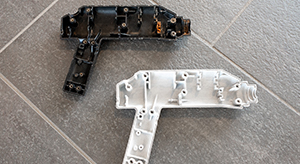 DMRI and Danish Crown - Boar pistol
DMRI and Danish Crown - Boar pistol
DMRI - Danish Meat Research Institute had to re-produce a tool for Danish Crown, but neither drawings nor injection molding tools existed anymore. Therefore, the solution was to do ‘reverse engineering’ using CT scanning and 3D printing.
In collaboration with the Danish Technological Institute, Manigrip developed an aid tool for arthritis patients. Thanks to 3D printing, the entire development process lasted less than half a year, and along the way Manigrip has had access to all competences under one roof.
Frese is a leading manufacturer of innovative flow control and component solutions for the HVAC market. In developing a special valve, metal 3D printing provided some completely new opportunities for designing and testing the prototype before production.
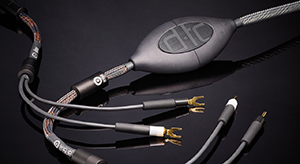 Ansuz Acoustics - Cable housing
Ansuz Acoustics - Cable housing
Ansuz Acoustics is a Danish company that develops and manufactures cables and accessories for high-end music systems, and with tremendous freedom of design and short development time on new products, 3D printing has proven to be the perfect solution for the housing where the cables are assembled.
When Marel had to develop a new support element for industrial cutting of meat, there was a need for innovation. Consequently, 3D printing in metal was considered at an early stage, resulting in fewer bacteria and greater food safety.
The company 4TECH has designed a tool changer that allows collaborative robots to switch between multiple tools. The Danish Technological Institute has helped optimize and print the tool changer, which is designed specifically for production with 3D printing.
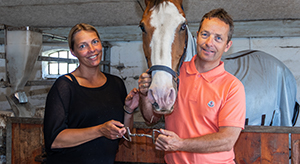 Adjustbit - Adjustable horse bite
Adjustbit - Adjustable horse bite
As an equine dentist, Glenn Espensen has often faced the challenge of having to guide customers towards the right horse bite. That's why the idea for Adjustbit was born - the world's first adjustable and modular horse bite. 3D metal printing at the Danish Technological Institute made it possible to realize the idea.Read more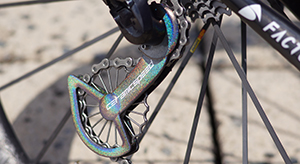 CeramicSpeed - Pulley wheels
CeramicSpeed - Pulley wheels
For many years, CeramicSpeed in Holstebro has collaborated with the Danish Technological Institute on the development of 3D-printed titanium pulley wheels. Now, CeramicSpeed is launching a new model of a 17-spoke 3D-printed pulley wheel.
Marel was developing a salmon gripper, and they decided to test the 3D printing technology. Today, they produce titanium salmon grippers with 3D printing at the Danish Technological Institute. It gives them great freedom of design and a short response time.
NRT X-RAY develops and manufactures medical X-ray equipment for hospitals. By producing 3D printed nylon covers for their equipment, they can quickly test new designs and create customized products for their customers.
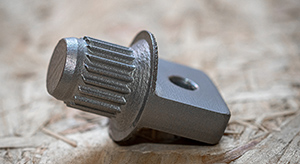 CCM Electronic Engineering - Shafts
CCM Electronic Engineering - Shafts
CCM Electronic Engineering develops systems for final testing of electronics and machine products. For one of these test systems, CCM needed a shaft with some specific contours and great robustness, and 3D printing in metal turned out to be the right solution.
At Marel's request, the Danish Technological Institute developed metal detectable nylon for 3D printing as well as a dipping process whereby 3D-printed nylon is easier to clean - in fact, it’s 118 times better measured on residual bacteria and on par with stainless steel.
Since 2008, the world’s largest producer of phono cartridges, the Danish company Ortofon A/S, has been using Additive Manufacturing (AM) for production of its new cartridges.
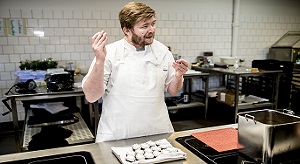 Bocuse d'Or - Kenneth Toft-Hansen
Bocuse d'Or - Kenneth Toft-Hansen
The Danish master chef Kenneth Toft-Hansen won the gold medal in the gastronomy competition Bocuse d'Or - and he uses Additive Manufacturing to shape his unique gastronomic creations.
In collaboration with two students from Aarhus University, the Danish Technological Institute has used 3D printing to reduce the weight of a cutting tap with more than 70% for Thürmer Tools.
Robot grippers must be as light and flexible as possible to achieve the best performance. The Danish Technological Institute has produced 3D-printed titanium grippers for the Danish company RoboTool.
Thanks to Additive Manufacturing, midwife Malene Hegenberger succeeded in accelerating the development of her new invention - Hegenberger Speculum. In collaboration with the Danish Technological Institute, 35 different versions of the product were completed in two months.
The leading Danish contractor group Aarsleff reduces energy, water and time consumption on sewer pipe repairs by using 3D-printed aluminium cylinders that are produced at the Danish Technological Institute.
With the use of Additive Manufacturing technology, the international hydraulic company Hydrauvision, was able to reduce pressure loss by as much as 25 % compared to the traditional solution.
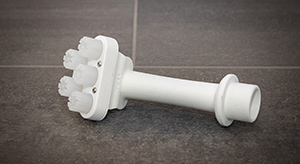 Danish Meat Research Institute
Danish Meat Research Institute
It was quite a task for the 3D printing experts at the Danish Technological Institute to get five suction channels and five opposite channels for scalding steam built into a flimsy handle. But they succeeded, and now the new five-finger steam suction is ready to be applied to Danish slaughterhouses.
